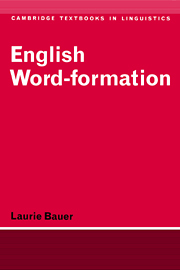Book contents
- Frontmatter
- Contents
- Dedication
- Preface
- 1 Introduction
- 2 Some basic concepts
- 3 Lexicalization
- 4 Productivity
- 5 Phonological issues in word-formation
- 6 Syntactic and semantic issues in word-formation
- 7 An outline of English word-formation
- 8 Theory and practice
- 9 Conclusion
- Bibliography and citation index
- Index
- Frontmatter
- Contents
- Dedication
- Preface
- 1 Introduction
- 2 Some basic concepts
- 3 Lexicalization
- 4 Productivity
- 5 Phonological issues in word-formation
- 6 Syntactic and semantic issues in word-formation
- 7 An outline of English word-formation
- 8 Theory and practice
- 9 Conclusion
- Bibliography and citation index
- Index
Summary
Trotz beträchtlicher Fortschritte ist die Bemerkung Wilhelm von Humboldts auch heute noche gültig, dass die Wortbildung den “tiefesten, geheimnisvollsten Teil der Sprache” bilde. [Despite considerable advances, Wilhelm von Humboldt's remark that word-formation is the “deepest, most secret part of language” is still valid even today.]
(Motsch, 1977: 201)In the past, the majority of studies of word-formation or word-formation processes have not distinguished between productive processes and lexicalized material. While such studies provide a wealth of extremely valuable data, it has been suggested here that the only realistic way of gaining a proper understanding of the way in which word-formation works is by ignoring lexicalized forms and concentrating on productive processes. Those scholars who have distinguished between productive and non-productive formations have usually taken the distinction no further. It has been shown that there is a vast number of factors, not all of them linguistic, which can limit productivity, and that productivity must be viewed as a cline, with some processes being more or less productive than other processes. Some of the theoretical linguistic factors involved in wordformation have been discussed, and it has been shown how lexicalization and productivity affect the syntactic and phonological descriptions of word-formation that have been proposed in the literature. An outline of the possibilities that are, or have been, available in English word-formation was given, showing just how wide a range of patterns can be found.
- Type
- Chapter
- Information
- English Word-Formation , pp. 292 - 296Publisher: Cambridge University PressPrint publication year: 1983

